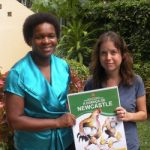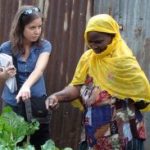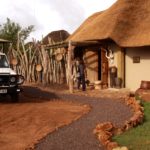As we talked to locals in Gaborone, Botswana’s capital city, people were so proud to talk about the things they love about their country.
“We are free here, our country is so peaceful, you don’t have to be afraid,” said one.
“You can criticize the government, you have free speech, free elections,” said another.
Botswana is indeed an incredible country.
 Home to not only the most beautiful wildlife we’ve seen yet, including elephants, giraffes, impala, kudu, and warthogs, Botswana is also where we’ve met some of the friendliest people. And it is one of the most vibrant political democracies we’ve seen so far, a nation proud of its peace and stability.
Home to not only the most beautiful wildlife we’ve seen yet, including elephants, giraffes, impala, kudu, and warthogs, Botswana is also where we’ve met some of the friendliest people. And it is one of the most vibrant political democracies we’ve seen so far, a nation proud of its peace and stability.
More than diamonds, people in Botswana consider water their most precious resource. This landlocked country’s national flag is blue to symbolize the element and it even named it currency “pula” or “rain.” Nearly everywhere you go in the country-including public toilets, sinks and showers-you see signs asking you to curb your consumption of water. These signs are tied to a massive national education and advertising campaign geared towards creating a general consciousness about the obligation as individuals to conserve water.
We visited a project helping to conserve another one of Botswana’s precious resources: wildlife. The Mokolodi Wildlife Reserve teaches the community about conserving and protecting wildlife and the environment, while also educating students about permaculture. By growing indigenous vegetables, recycling water for irrigation, and using organic fertilizers-including elephant dung-the Reserve’s Education Center is demonstrating how to grow nutritious food with very little water or chemical inputs.
We can learn a lot from Botswana on the importance of conservation. Here are two simple techniques they are using to curb consumption of energy and resources:
1. All electrical outlets-from the city to the countryside-come with an on/off switch. While this switch might sound simple, how many times have you seen these in the United States (instead of just having to unplug everything), Televisions, alarm clocks, air conditioners, and other appliances are programmed to withstand these power shifts and they don’t have to be reset when the power is turned back on.
2. We’ve all seen plastic bags on the side of the road or in trash bins-taking many lifetimes to biodegrade -and doing irrevocable damage to the environment. While a few U.S. cities- such as Seattle, San Francisco, and Washington DC have implemented a small fee- or even an altogether ban- for plastic bags, we were impressed that Botswana has already implemented a surprisingly high (by local stands) national fee for their use or purchase. As a result, people bring their own bags to the grocery store or use no bag at all. Check out this interesting page on plastic bags by the Worldwatch Institute.
Who we are: BorderJumpers began in October 2009 in Addis Ababa, Ethiopia — when Bernard Pollack and Danielle Nierenberg began a journey to travel in Africa. At every stop they are meeting with farmers, community organizers, labor activists/leaders, non-governmental organization (NGOs), the funding and donor communities, and local, regional, and international press.
With a Sony handycam, a 8-year old laptop, and sporadic internet connections – their goal is to bring stories of hope from across the region to as large an audience as possible. They will tell the stories that aren’t being told-from oil workers fighting to have a union in Nigeria to innovative ways farmers and pastoralists are coping with climate change.







Leave a Reply